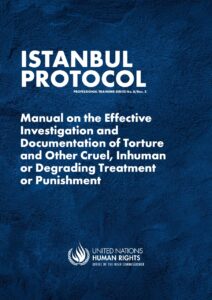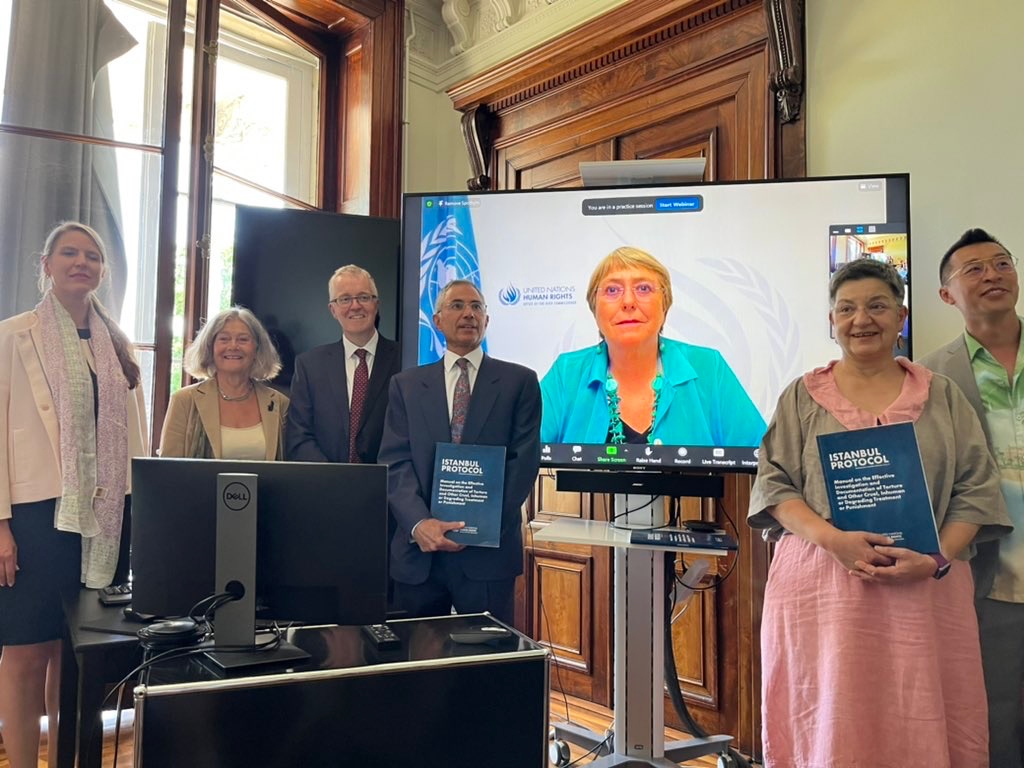29 JUNE 2022
GENEVA – The Office of the United Nations High Commissioner for Human Rights (OHCHR) today published the 2022 edition of the Istanbul Protocol: Manual on the Effective Investigation and Documentation of Torture and Other Cruel, Inhuman or Degrading Treatment or Punishment with contributions from more than 180 anti-torture experts from 51 countries. The new edition of the Istanbul Protocol is strengthened with lessons learned from 20 years of implementation experience, providing critical guidance to States to ensure they fulfil their treaty obligations to investigate, prosecute, and punish torture under the UN Convention against Torture (UNCAT) and international law.
Since its official endorsement by OHCHR in 1999, the Istanbul Protocol’s standards have been adopted by international, regional, and national human rights bodies and legal mechanisms and have served as the global standards for investigations into allegations of torture and ill-treatment. The Istanbul Protocol has informed countless medico-legal investigations conducted by both State and non-State actors into torture worldwide. It has served as a guide to clinicians in best practices for their conduct and documentation of medico-legal assessments of individuals alleging torture and/or ill treatment. The Istanbul Protocol has shaped a broad range of anti-torture activities including advocacy, training and capacity building, policy reform, prevention, and treatment, and rehabilitation of torture survivors.
The major international effort to update the Istanbul Protocol reflects advances in the global understanding of the practices and effects of torture and ill-treatment as well as the practical experiences in using the Istanbul Protocol during the past 20 years. The update also seeks to help prevent deliberate misuse of the Istanbul Protocol standards by States, which has been seen on several occasions since the publication of the Istanbul Protocol.
The update was led by representatives of four civil society organisations; (Physicians for Human Rights, the International Rehabilitation Council for Torture Victims, the Human Rights Foundation of Turkey, and REDRESS); and the four core United Nations anti-torture bodies (the Committee against Torture, the Subcommittee on Prevention of Torture, Special Rapporteur on Torture, and the United Nations Voluntary Fund for Victims of Torture). The updated Istanbul Protocol is the culmination of a six-year process, including regional coordination meetings in Bishkek, Mexico City, and Copenhagen, and a survey of more than 200 individuals who have substantial experience using the Protocol in anti-torture activities.
In addition to updating the six original chapters of the Istanbul Protocol, the 2022 edition includes two new chapters which provide guidance on the role of health professionals in various contexts in which documentation may be necessary (chapter VII) and guidance on the necessary conditions for effective implementation of the Istanbul Protocol by States (chapter VIII).
“The Istanbul Protocol has transformed how we understand, investigate, document, and work towards the eradication of torture around the world,” said Dr. Vincent Iacopino, Istanbul Protocol Editorial Committee Member, former Medical Director and current Advisory Council member at Physicians for Human Rights, and Adjunct Professor of Medicine at University of Minnesota Medical School. “Nearly 75 years after world governments agreed to prohibit torture, these heinous practices continue in more than half of the world’s countries, often with impunity. We call on all States to fully implement these standards and meet treaty obligations to prevent torture and ill-treatment, hold perpetrators accountable, and afford victims the redress and rehabilitation they are entitled to under international law.”
“The strengthened Istanbul Protocol will be a vital resource for survivors, clinicians, litigators, governments, and civil society, bolstering our collective work towards a world free of torture,” said Jens Modvig, Istanbul Protocol Editorial Committee Member, former Chair at Committee against Torture, Director of the Health Department at Dignity – Danish Institute against Torture, and Head of the International Accountability Platform for Belarus. “It also provides an international point of reference to prevent neglect, misinterpretation, or falsification of torture evidence by health professionals, either willingly or under coercion.”
“The extent to which States implement Istanbul Protocol standards should be considered a measure of their commitment to ending torture and other ill-treatment,” said James Lin, Istanbul Protocol Editorial Committee Member, Istanbul Protocol Programme Coordinator at the International Rehabilitation Council for Torture Victims, and Adjunct Professor of Law at National Yang Ming Chiao Tung University.
The Istanbul Protocol 2022 includes a foreword by Michelle Bachelet, United Nations High Commissioner for Human Rights, who writes:
“The OHCHR remains committed to assist States to eradicate torture and ill-treatment, to implement international human rights standards effectively and to place redress for victims, including rehabilitation, at the centre of their efforts. I therefore encourage States and non-State actors, civil society, individual practitioners and everyone concerned in preventing and protecting against torture and ill-treatment to use the new edition of the Istanbul Protocol.”
Key updates and additional guidance in the Istanbul Protocol 2022 edition include:
- Clarifications on the definition and scope of torture and ill-treatment based on 20 years of practice and jurisprudence and updating relevant mechanisms for torture prevention, accountability, and redress. (Chapter I)
- Updates on relevant ethical obligations for legal and health professionals, including guidance on addressing conflicting obligations. (Chapter II)
- Best practices on legal investigations of torture and ill-treatment, including new guidance for judges, prosecutors, and other actors. (Chapter III)
- Updated practices on the clinical evaluations of physical and psychological evidence and applying new guidance on evaluations of children and lesbian, gay, bisexual, transgender, and intersex (LGBTI) persons. (Chapters IV, V, VI)
- Applying clear and consistent guidance on the interpretation of physical and psychological evidence of torture and ill-treatment, and the obligation to provide a conclusion on the possibility of torture. (Chapters IV, V, VI)
- Recognising limitations of the Istanbul Protocol and preventing misuse, such as when States exonerate perpetrators due to an absence of physical or psychological findings of torture or when they arbitrarily disqualify independent, non-governmental clinical experts from testifying in judicial proceedings. (Chapter IV)
- Applying additional guidance for clinicians on the documentation of torture and ill-treatment in non-legal contexts. (Chapter VII)
- Requirements for States to undertake comprehensive and sustained action to implement the Istanbul Protocol and its Principles in collaboration with international actors and members of civil society. (Chapter VIII)
The 2022 edition of the Istanbul Protocol will be made available for download in all six official United Nations languages on the website of the OHCHR: https://www.ohchr.org/en/publications/policy-and-methodological-publications/istanbul-protocol-manual-effective-0.
Istanbul Protocol 2022 Editorial Committee Members:
Dr. Vincent Iacopino, former Senior Medical Advisor, Physicians for Human Rights; Adjunct Professor of Medicine, University of Minnesota Medical School; Senior Research Fellow, Human Rights Center, University of California, Berkeley
James Lin, Istanbul Protocol Programme Coordinator, International Rehabilitation Council for Torture Victims; Adjunct Professor of Law, National Yang Ming Chiao Tung University
Dr. Şebnem Korur Fincancı, President, Turkish Medical Association; Executive Board Member, Human Rights Foundation of Turkey; Emeritus Professor of Forensic Medicine, Istanbul University Faculty of Medicine
Chris Esdaile, Legal Adviser, REDRESS
Dr. Jens Modvig, Head of the International Accountability Platform for Belarus; former Director, Health Department, Dignity – Danish Institute against Torture; former Chair, Committee against Torture
Nora Sveaass, Professor Emerita, University of Oslo; member, Subcommittee on Prevention of Torture and Other Cruel, Inhuman or Degrading Treatment or Punishment
Dr. Vivienne H. Nathanson, Chair, United Nations Voluntary Fund for Victims of Torture; former Director of Professional Activities, British Medical Association
Prof. Dr. Nils Melzer, former UN Special Rapporteur on torture and other cruel, inhuman or degrading treatment or punishment (2016-2022); Professor of International Law, University of Glasgow; Swiss Human Rights Chair, Geneva Academy of International Humanitarian Law and Human Rights; Vice-President, International Institute of Humanitarian Law Special Rapporteur on torture and other cruel, inhuman or degrading treatment or punishment


